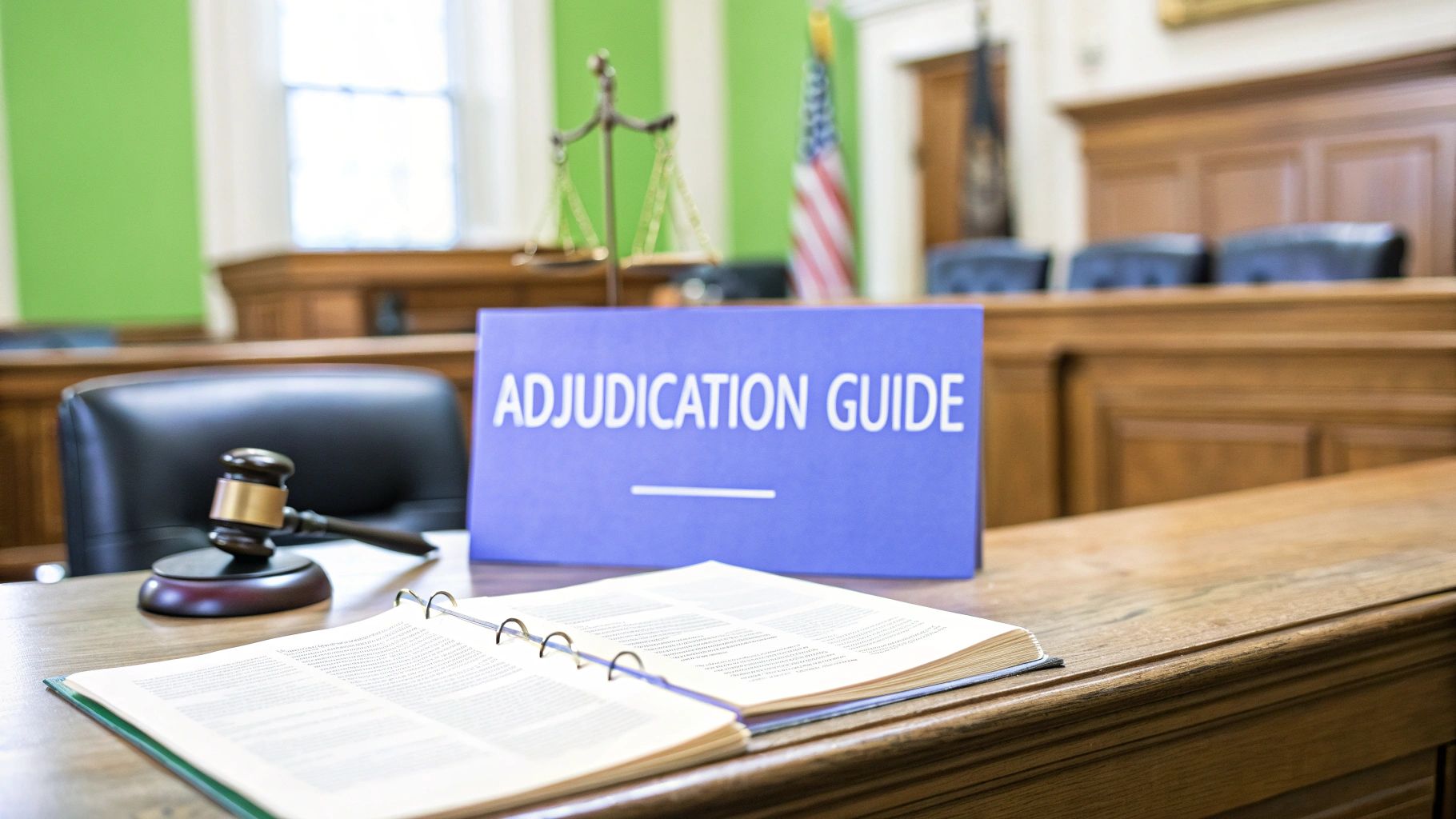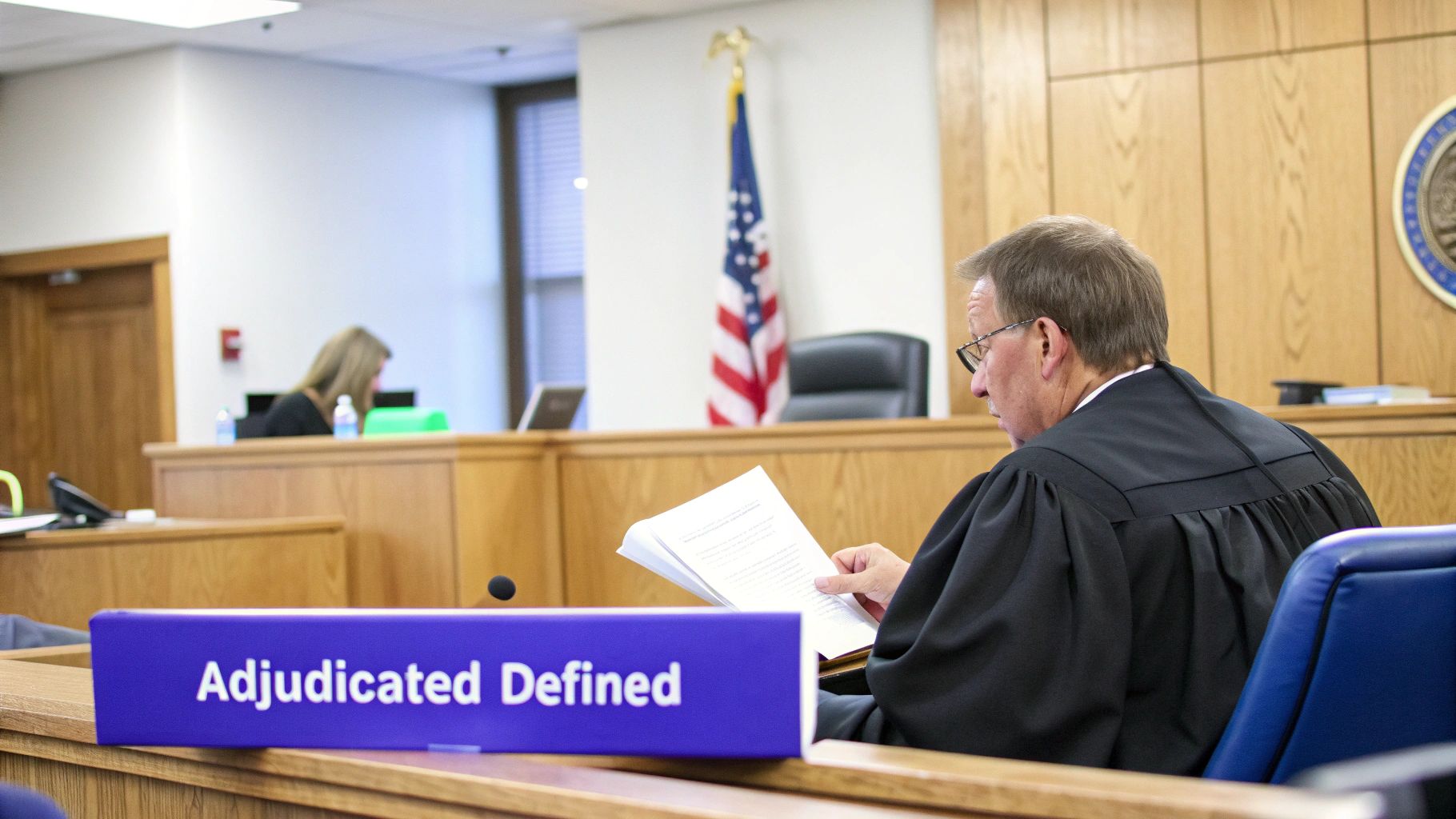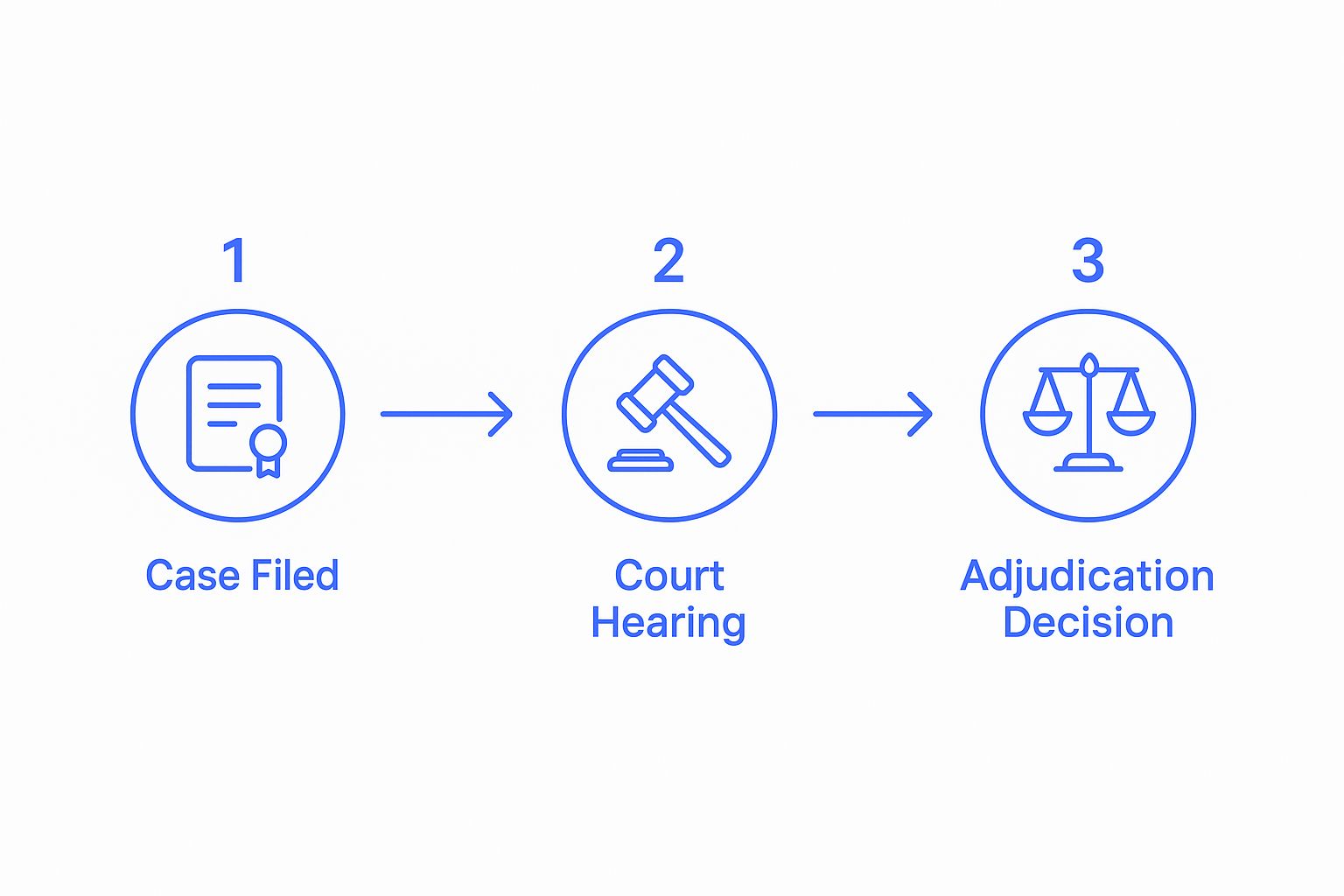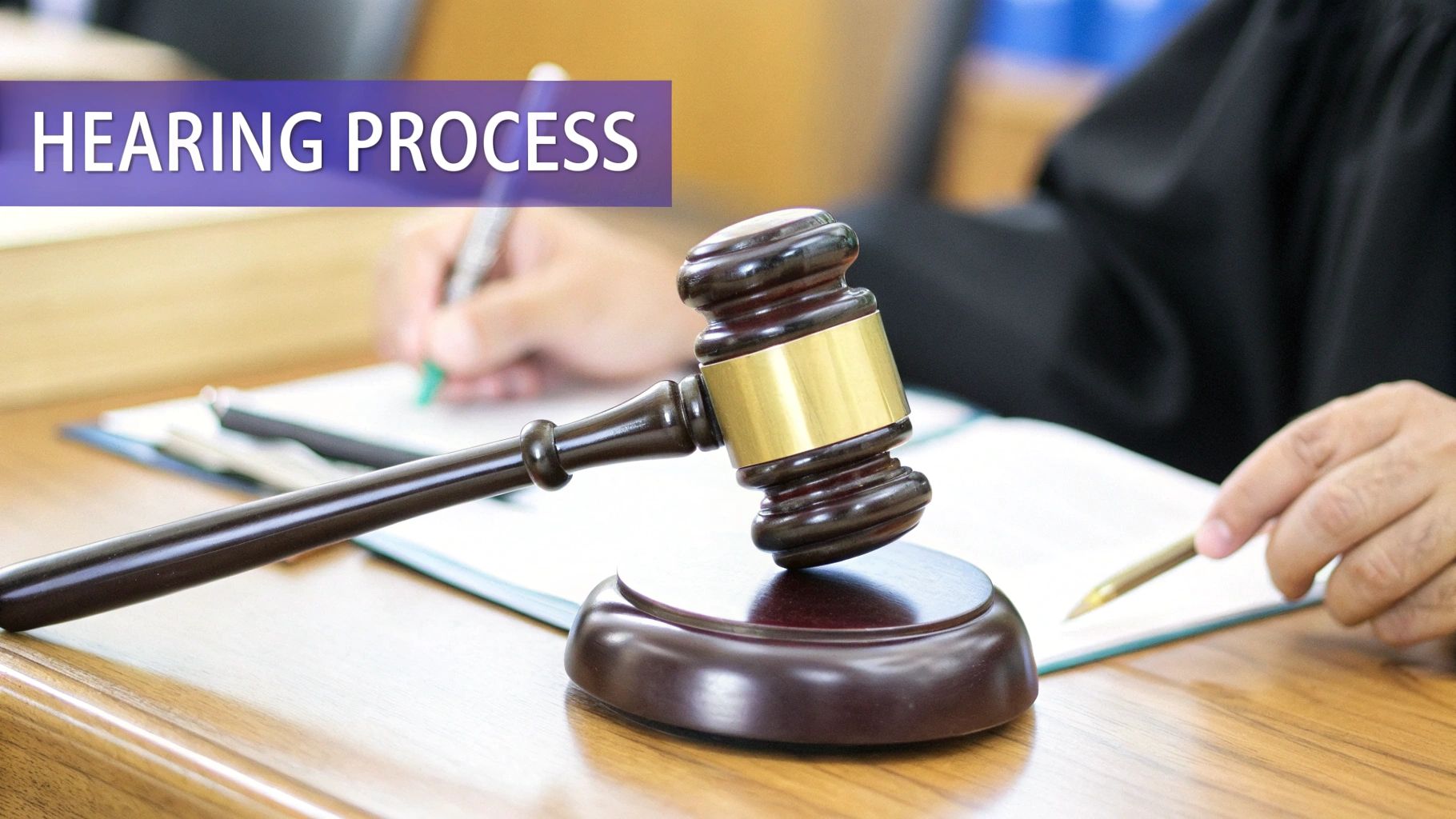
When you hear a legal term like adjudicated, it’s easy to get lost in the jargon. But the concept is actually pretty simple: it means a court has officially made a final decision on a legal issue.
Think of it as the final whistle in a game. The referee has made the call, the dispute is settled, and the outcome is official.
The Core of a Court's Final Decision

When a case is "adjudicated," it’s reached the end of the line. The court has gone through the entire process of hearing arguments, looking at evidence, and applying the law. The judgment it issues is now legally binding for everyone involved.
This isn't just about a win-or-lose scenario; it's about resolution. Let’s say a landlord and tenant are fighting over a security deposit. They take the issue to small claims court, present their cases, and a judge makes a ruling. That whole process is adjudication in action.
Adjudication is the legal system's way of turning a messy conflict into a settled outcome. It delivers the finality everyone needs to move on, knowing the matter is officially closed.
Understanding what adjudicated means in court is your first step to cutting through the legal-speak. It's the official stamp that says a case is done, whether it involves:
- Criminal charges: A judge or jury determines guilt or innocence.
- Civil lawsuits: A court decides who is at fault in a car accident claim.
- Family matters: A judge finalizes a divorce or sets a custody schedule.
Ultimately, adjudication takes a situation full of uncertainty and turns it into a clear, enforceable court order.
Adjudication at a Glance
To make this even clearer, let's break down the key parts of the adjudication process. This table shows how the different pieces come together in a legal setting.
| Component | What It Means | Simple Example |
|---|---|---|
| Formal Process | A structured legal proceeding where evidence and arguments are presented. | A small claims court hearing. |
| Neutral Third Party | An impartial decision-maker, usually a judge or an administrative official. | A judge listening to both sides of a dispute. |
| Application of Law | The decision-maker applies relevant laws and precedents to the case facts. | A judge citing a specific traffic law in a speeding ticket case. |
| Final Decision | A binding and enforceable judgment or ruling that resolves the issue. | A court order requiring one party to pay damages to another. |
Each component is essential. Without a formal process, arguments would be chaotic. Without a neutral party, the decision wouldn't be fair. And without a final decision, the conflict would never end.
The Path to a Final Court Decision
A court's decision doesn't just appear out of thin air. An adjudicated outcome is actually the final stop on a highly structured legal journey, one designed to make sure every dispute is handled fairly and methodically. This process is what transforms a raw conflict into a formal resolution.
It all kicks off when one party files a lawsuit (in a civil case) or a prosecutor files charges (in a criminal one). This first step officially lands the case on the court's calendar, known as the docket. From that point on, the docket tracks every document and scheduled event all the way to the final judgment.
Next, the case moves into the discovery and hearing phase. This is where both sides gather and swap evidence, interview witnesses, and present their legal arguments before a judge. The whole point is to lay all the facts on the table so each party can build its case.
This visual breaks down the basic workflow, from the moment a case is filed to the final adjudicated decision.

As you can see, adjudication is the definitive end-point of this formal court process.
The Hearing and Judgment
The heart of the entire process is the court hearing or trial. This is where evidence is officially presented, witnesses testify under oath, and lawyers make their final stand with closing arguments. The core question of the dispute gets debated and examined right here, all based on established legal standards.
Before a final decision is reached, many civil disputes—especially in family law—go through mediation as a key step. For anyone facing this, learning more about preparing for custody mediation can be incredibly helpful.
Ultimately, adjudication happens when the judge or jury takes all the information presented, applies the relevant laws to the facts, and makes a call. The resulting verdict or judgment is the final, legally binding decision that settles the case.
This outcome is then officially recorded, creating a clear and enforceable resolution. It’s this journey—from the initial filing to the final judgment—that gives a court’s decision its authority and finality, ensuring the process is thorough and just for everyone involved.
Adjudication in Criminal Cases
In the high-stakes world of criminal law, the word adjudicated carries some serious weight. When a case is adjudicated, it’s not just another procedural step—it means a judge or jury has officially decided whether the defendant is guilty or innocent. This is the moment of truth that brings the case to a final, binding conclusion.

This final judgment is where the abstract legal process smacks right into real-world consequences. An adjudication of guilt is, for all practical purposes, a conviction. It’s the court's official stamp, confirming the prosecution proved its case beyond a reasonable doubt.
The Impact of an Adjudication of Guilt
Once a defendant is adjudicated guilty, the case shifts straight to sentencing. But the fallout goes far beyond jail time or fines, often reshaping a person’s entire life and stripping them of fundamental civil liberties.
In a criminal case, an adjudication of guilt formally convicts the defendant. This can trigger a cascade of serious consequences, especially for felony convictions, including the loss of:
- The right to own a firearm
- Voting rights
- The ability to hold public office
This final court decision is the point of no return for many of these rights. The whole point of the adjudication process is to ensure these severe outcomes are based on a structured evaluation of evidence, not on a whim.
The moment a judge says "adjudicated guilty," a defendant's legal status is permanently altered. This single phrase transforms them from an accused individual into a convicted one, triggering a cascade of legal and social penalties that can last a lifetime.
Beyond the Verdict
It's important to remember that not every case ends with a guilty verdict. A case can also be adjudicated with a "not guilty" finding—legally known as an acquittal—which clears the defendant of all charges. A judge could also dismiss a case entirely due to procedural mistakes or a lack of evidence, which is another form of final adjudication.
Still, the possibility of a guilty outcome really drives home the gravity of this legal step. It’s why every decision leading up to it is so critical. The defenses used, like claiming you acted under extreme pressure, can sometimes sway the final outcome. To get a better sense of how courts evaluate those kinds of pressures, check out our guide on duress in contracts. This context helps clarify why the court's final word is so powerful.
Adjudication in Civil Disputes
 When most people think of court, they picture a criminal trial. But not every case involves a crime. In fact, the vast majority of legal disputes fall under civil law, where adjudication plays a different, but equally critical, role. It’s the formal process courts use to settle disagreements between people, businesses, or other organizations.
When most people think of court, they picture a criminal trial. But not every case involves a crime. In fact, the vast majority of legal disputes fall under civil law, where adjudication plays a different, but equally critical, role. It’s the formal process courts use to settle disagreements between people, businesses, or other organizations.
Instead of deciding guilt or innocence, civil adjudication is all about liability. The central question is simple: did one party harm another, and if so, what’s the right way to fix it? These cases cover all sorts of everyday conflicts, from contract breaches and personal injury claims to family law matters.
Ultimately, the court's final decision provides a legally binding solution. It brings closure to arguments that might otherwise fester for years.
Different Stakes and Standards
One of the biggest differences you'll find in civil court is the standard of proof. Criminal cases demand proof "beyond a reasonable doubt"—a very high bar. Civil courts, on the other hand, operate on a "preponderance of the evidence."
This just means the judge or jury only needs to be convinced that it's more likely than not (think a 50.1% chance) that a claim is true. The goal isn't punishment; it's about assigning responsibility and ordering a remedy, which is usually some form of financial compensation.
Here’s a classic real-world example:
- The Dispute: A landlord keeps a tenant’s entire security deposit, claiming the apartment was left with significant damage. The tenant disagrees.
- The Adjudication: They end up in small claims court. A judge listens to both sides and looks at the evidence—photos, emails, and maybe a witness statement or two.
- The Decision: The judge concludes the tenant did cause some minor damage, but the landlord unfairly withheld far too much money. The case is adjudicated, and the judge orders the landlord to return a portion of the deposit.
In civil court, adjudication is the final word that untangles a dispute. It provides a formal, binding resolution that determines who is liable and what they must do to compensate the other party.
This binding nature is what gives adjudication its power. Once a decision is handed down, it’s legally enforceable. Whether it's a personal injury lawsuit or a complex business disagreement, the court's ruling settles the matter once and for all. To learn more about how different types of adjudication work and their legal impact, you can find helpful information on expresslegalfunding.com. This process ensures everyone involved gets a clear, final outcome.
Why Adjudication Creates Finality in Law
So, why is a court's final ruling such a big deal? It all comes down to a crucial legal concept called finality. When a court adjudicates a case, it’s not just hitting the pause button—it’s drawing a firm line in the sand. This is the official end of that particular dispute, preventing our justice system from becoming a revolving door of the same old arguments.
Imagine a world without it. Someone could get sued over the same exact issue again and again, creating a nightmare of endless costs and uncertainty. Adjudication acts as a definitive full stop. It allows everyone involved, from individuals to entire companies, to finally move on, confident that the matter is legally put to rest.
This idea is so fundamental that it’s supported by some powerful legal doctrines. The principle of former adjudication, which includes concepts like res judicata, makes it clear: once a legal matter has been formally decided, it can’t be dragged back into court in a new lawsuit. You can learn more about how adjudication provides this legal certainty on law.cornell.edu.
Putting a Stop to Endless Legal Fights
The finality that comes from an adjudicated outcome is what makes our justice system stable and predictable. It gives a court's decision real teeth, making it far more than just a strongly worded opinion.
Here’s what that looks like in practice:
- It provides closure. People caught up in a legal battle need a clear end. Adjudication delivers that.
- It creates stability. Knowing a decided issue will stay decided allows people and businesses to make plans for the future without looking over their shoulder.
- It builds trust. When the public sees that court decisions are final and binding, it reinforces confidence in the entire legal process.
This sense of finality is the polar opposite of other legal outcomes where a decision is wiped off the books. To see the contrast, check out our guide on what it means when a legal action is quashed. At the end of the day, adjudication is the mechanism that ensures justice isn't just a suggestion—it's a conclusion.
Still Have Questions About Adjudication?
It's one of those legal terms that sounds simple enough, but the way it works in the real world can bring up some questions. Let's clear up a few of the most common points of confusion people run into.
What’s the Difference Between Adjudicated and Convicted?
People often use these terms like they mean the same thing, but there’s a key difference. "Convicted" is a very specific label. It only applies in criminal cases where someone has been formally found guilty of a crime. That’s its only job.
"Adjudicated," on the other hand, is a much bigger umbrella. It refers to the final decision in any legal proceeding. A criminal conviction is one type of adjudication, but so is an acquittal (a "not guilty" verdict). A final judgment in a civil lawsuit—like a dispute over a business contract—is also an adjudication.
In short, every conviction is an adjudication, but not every adjudication is a conviction. Think of "adjudication" as the final word from the court, no matter what that word is.
Can a Case Be Adjudicated Without a Trial?
Absolutely, and it happens all the time. Many people picture a dramatic courtroom trial, but a huge number of cases are resolved—or adjudicated—long before that point. Here’s how:
- Plea Bargains: In the criminal justice system, a defendant might agree to a plea deal. The case is then adjudicated based on that plea, with a formal judgment of guilt, and no trial is needed.
- Summary Judgments: This is common in civil lawsuits. A judge can issue a "summary judgment" if the facts of the case are so clear and undisputed that a trial would be pointless. The judge makes a final ruling right then and there.
- Default Judgments: If someone being sued simply doesn’t respond or show up to court, the judge can issue a "default judgment" against them. The case is adjudicated in favor of the party who did show up.
What Happens After a Case Is Adjudicated?
Once the court has adjudicated a case, its decision is official, legally binding, and enforceable. What comes next really depends on the outcome and the type of case.
If a defendant in a criminal case is found guilty, the next step is sentencing. If a company loses a civil suit, it will have to follow the court's order, which usually means paying damages or taking a specific action.
The losing party can often appeal the decision to a higher court, but until that higher court says otherwise, the original adjudicated ruling stands.
Trying to make sense of the final documents from an adjudicated case can feel like reading another language. Instead of struggling with dense legal text, let Legal Document Simplifier handle it. Upload your court orders, judgments, or settlement agreements and get a plain-English summary in minutes. Visit https://legaldocumentsimplifier.com to get the clarity you need.